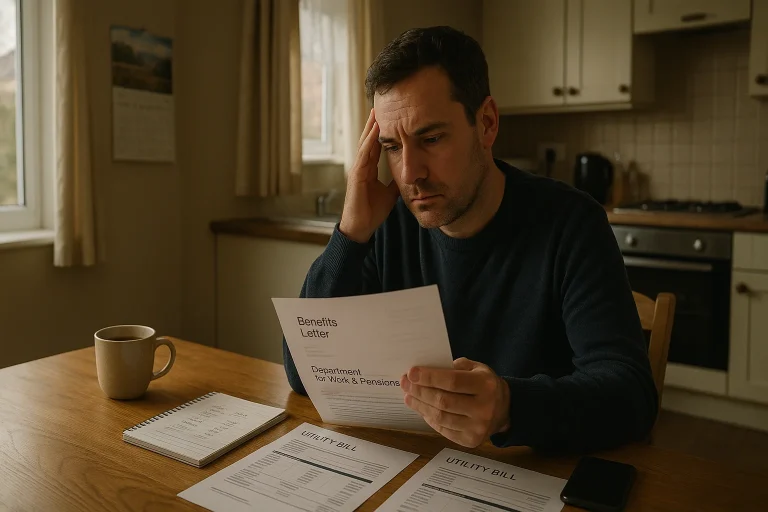Missing a Universal Credit appointment can be stressful, especially when your circumstances are outside your control. Whether you were unwell, faced a family emergency, or experienced unexpected transport failure, not being able to attend might leave you concerned about possible sanctions.
The Department for Work and Pensions (DWP) does, however, consider many legitimate reasons to be acceptable, as long as they are reported clearly and promptly. Knowing what qualifies as a valid excuse can help you avoid penalties and maintain your benefit payments.
In this guide, you’ll find 20 of the most recognised acceptable reasons for missing a Universal Credit appointment, with practical advice on how to report them and what evidence to provide.
Every situation is unique, but with the right knowledge, you can protect your rights and stay compliant. Let’s explore the essentials you need to know when life gets in the way of your DWP commitments.
What Counts as an “Acceptable Reason” for Missing a Universal Credit Appointment?

An acceptable reason for missing a Universal Credit appointment is known by the DWP as having a “good cause.” This means your absence was caused by something unexpected, unavoidable, or outside of your control, and that it prevented you from attending, despite your intention to do so.
The DWP doesn’t rely on a fixed list but instead looks at each case individually. Factors like timing, communication, and the credibility of your explanation all play a part in whether your reason is accepted.
The most common acceptable reasons include illness, bereavement, family emergencies, court obligations, transport failures, or technical issues.
For your reason to be considered, you must inform the DWP as soon as possible. Ideally, you should report it through your Universal Credit journal and include supporting documents to back up your claim.
The more transparent and prompt your explanation, the more likely your absence will be excused. The DWP generally responds with fairness when genuine reasons are clearly communicated with supporting evidence.
Why Is Attending Universal Credit Appointments So Important?
Universal Credit appointments are a key part of managing your claim. They’re used to track your job-seeking efforts, review your financial situation, and make sure you’re meeting the terms of your claimant commitment.
These meetings may take place in person, over the phone, or online, depending on your circumstances. Missing one without a valid reason could be seen as a sign that you’re not actively engaging with your responsibilities, which may lead to benefit sanctions.
The DWP uses your attendance as an indicator of your willingness to cooperate with their support services.
Attending appointments not only helps you stay on track with your claim but also gives you the opportunity to discuss changes in your situation, ask questions, and seek guidance.
When you fail to show up without explaining why, it creates gaps in your record and could delay support. To protect your benefits, it’s essential to treat each appointment as mandatory and to communicate quickly if something prevents you from attending.
What Happens If You Miss a Universal Credit Appointment Without a Valid Reason?
Missing a Universal Credit appointment without giving a valid reason can lead to serious consequences. The DWP views these appointments as a critical part of your agreement to actively engage with the support system.
If you fail to attend and do not explain your absence in time or provide an acceptable reason, your claim may be marked as non-compliant. This often triggers a sanction process which affects your payments.
Sanctions are applied in stages, depending on your history and the nature of the absence:
- First-time offence may result in a warning or a short sanction.
- Repeated missed appointments could lead to longer deductions from your benefits.
- Persistent non-attendance may be escalated to a decision maker for formal review.
The DWP considers the timing of your response, the clarity of your explanation, and whether you provided evidence.
If your absence remains unexplained or unjustified, payments may be reduced or stopped temporarily. Prompt, honest communication is key to avoiding penalties.
Can You Avoid Sanctions If You Miss an Appointment?

Yes, it’s possible to avoid sanctions, but only if you act quickly and give the DWP a clear, acceptable reason for your absence. Timing is everything. If you know in advance that you can’t attend, inform your work coach or update your Universal Credit journal straight away.
If the reason arises suddenly, such as a medical emergency or family crisis, report it as soon as you’re able. The DWP will ask why you missed the appointment, and it helps to be specific.
Explain what happened, when it occurred, and how it stopped you from attending. Include documentation if available, such as a doctor’s note or travel disruption alert.
A well-explained message with proof often leads to your appointment being rescheduled rather than sanctioned.
While there’s no guarantee, the DWP does recognise that life is unpredictable, and they are more likely to be flexible if your communication is prompt and honest. Doing this helps protect your payments and keeps your record in good standing.
What Evidence Does the DWP Accept for Missed Appointments?
When you’ve missed a Universal Credit appointment, providing supporting evidence greatly increases your chance of avoiding a sanction.
The DWP looks for documents or information that verify your explanation and show that the absence was genuine and unavoidable. Although evidence isn’t always mandatory, it strengthens your case and speeds up the process of rescheduling your appointment.
Accepted types of evidence include:
- Medical: GP letters, sick notes, hospital discharge papers, or prescriptions.
- Legal: Court summons, tribunal dates, or solicitor confirmations.
- Childcare: School closure alerts, messages from nurseries, or babysitter cancellations.
- Transport/Weather: Screenshots of cancelled services, traffic reports, or weather warnings.
- Technical: Photos of device errors, internet outage confirmations, or repair invoices.
- Emergency events: Police reports, housing letters, or fire brigade documentation.
You can upload evidence directly to your Universal Credit journal. If digital upload isn’t possible, you can post or bring it in. Timely and clear documentation helps the DWP assess your case fairly.
Top 20 Acceptable Reasons for Missing a Universal Credit Appointment
1. Illness or Medical Emergency

Illness or a sudden medical emergency is one of the most recognised acceptable reasons for missing a Universal Credit appointment. When you are unwell or experiencing symptoms that prevent safe travel or communication, the DWP generally accepts your absence as long as you explain what happened.
Conditions such as high fever, infections, asthma flare ups, severe migraines, or unexpected hospital visits make it unreasonable to expect you to attend. Even minor conditions can count if they genuinely affect your ability to travel or participate in a phone or online appointment.
Sharing the full context helps your work coach understand the situation clearly. Providing evidence where possible also strengthens your explanation.
Helpful examples of evidence include:
| Evidence Type | Example or Description |
|---|---|
| GP Letter or Sick Note | Written confirmation of illness from your doctor |
| Hospital Document | A&E discharge summary or hospital admission letter |
| Prescription Record | Proof of prescribed medication with date and condition noted |
| Appointment Slip | Proof of medical appointment around the date of absence |
If you report the illness quickly and include brief details about its impact on your ability to attend, the DWP usually responds with understanding and reschedules your appointment without a sanction.
2. Mental Health Crisis

A mental health crisis can make it extremely difficult to attend a Universal Credit meeting, whether it is in person, by phone, or online.
Anxiety attacks, severe depression, trauma responses, or episodes related to conditions like PTSD can affect your ability to communicate or leave your home. The DWP increasingly recognises that mental health challenges can be just as limiting as physical illness.
When a mental health episode prevents attendance, you should explain the situation in your journal once you feel well enough. The DWP does not expect detailed personal disclosures, only an explanation that a mental health issue stopped you from taking part.
Helpful examples of evidence include:
| Evidence Type | Example or Description |
|---|---|
| Therapist or GP Letter | Statement explaining mental health episode or treatment |
| Support Worker Note | Confirmation from support agency detailing crisis impact |
| Appointment Confirmation | Proof of attending or booking a mental health session |
| Self-written Journal Entry | Detailed personal explanation if no formal documentation is available |
You can also mention how the episode affected your concentration, mobility, or emotional stability. When mental health is communicated openly and respectfully, the DWP usually accepts it as a valid reason and offers support to help you rebook your appointment.
3. Bereavement or Funeral

Experiencing a death in the family or losing someone close can leave you emotionally overwhelmed and unable to attend your Universal Credit appointment. The DWP recognises bereavement as a compassionate and acceptable reason for missing a meeting.
Whether you were grieving, arranging funeral plans, attending the service, or supporting others affected by the loss, these circumstances are seen as valid.
Emotional shock can also make it difficult to focus or travel. When reporting bereavement, explain the relationship with the person who passed away and, if possible, mention the date the loss occurred. You do not need to share sensitive details.
Helpful examples of evidence include:
| Evidence Type | Example or Description |
|---|---|
| Funeral Invitation | Document showing date, time, and relation to deceased |
| Death Certificate | Official document confirming bereavement |
| Letter from Funeral Director | Confirmation of your role in arrangements or service attendance |
| Counsellor’s Note | If grieving affected your ability to attend |
Notifying the DWP as soon as you feel able helps prevent misunderstandings and reassures your work coach that your absence was genuine. When communicated with clarity, bereavement is almost always accepted without penalty.
4. Caring for a Dependent or Elderly Person

Caring responsibilities often change without warning, and an emergency involving a dependent, elderly parent, or disabled person can prevent you from attending your appointment.
The DWP acknowledges that carers frequently have limited support and that their responsibilities are unpredictable. If someone you care for becomes ill, distressed, injured, or requires urgent assistance, your priority will naturally be their wellbeing.
When reporting this to the DWP, explain what happened and how your role as a carer made it impossible to attend your meeting. Even temporary situations, such as a child falling ill at school or an elderly parent needing immediate help, are considered reasonable.
Helpful examples of evidence include:
| Evidence Type | Example or Description |
|---|---|
| GP Note | Confirmation of dependent’s health condition |
| Social Worker Letter | Statement explaining care responsibilities |
| School or Nursery Message | Notice about emergency pick-up or illness |
| Emergency Service Note | In case paramedics or urgent care were involved |
Providing a clear explanation helps the DWP understand the urgency of your situation. Most caring emergencies are accepted quickly, as safety and support for dependents take priority.
5. Emergency Childcare Issues

Unexpected childcare problems can arise at any time and are a common acceptable reason for missing a Universal Credit appointment.
If your child falls ill at school, if a nursery closes suddenly, or if a caregiver cancels at short notice, finding alternative arrangements can be impossible.
The DWP recognises that childcare emergencies are often outside your control and that your child’s safety must come first.
When explaining the situation, give brief details of what occurred and the time it happened. Even when you cannot provide formal evidence, a clear and honest message usually helps your work coach understand your absence.
Helpful examples of evidence include:
| Evidence Type | Example or Description |
|---|---|
| School or Nursery Closure | Message confirming closure or emergency pickup |
| GP Note for Child | If the child was unwell and needed care |
| Childcare Provider Message | Text or email showing cancellation of scheduled care |
| Attendance Record | Showing absence due to sudden childcare need |
If you report the emergency quickly through your journal and request a new appointment, the DWP typically accepts the reason and reschedules without any deduction to your payments.
6. Court Date or Tribunal Appearance

Legal obligations take priority over Universal Credit appointments, and the DWP accepts court dates, tribunal hearings, or solicitor meetings as valid reasons for not attending.
If you are summoned to court for jury duty, a civil or criminal case, or as a witness, you are legally required to attend. Similarly, housing disputes, family court matters, and immigration tribunals may conflict with DWP meetings.
The key is to notify the DWP as soon as you receive the date and share proof of the obligation. These appointments are often fixed and cannot be rescheduled, so the DWP understands the conflict.
Helpful examples of evidence include:
| Evidence Type | Example or Description |
|---|---|
| Court Summons | Official letter stating required court appearance |
| Tribunal Notice | Schedule or invitation to attend a tribunal hearing |
| Solicitor Letter | Confirmation of appointment with legal representative |
| Legal Aid Correspondence | Proof of involvement in an active case |
Make sure to log the appointment details in your Universal Credit journal before or immediately after the court date. When legal matters are reported promptly and clearly, they are rarely disputed and usually result in your Universal Credit appointment being rearranged without any sanction.
7. Police Detention or Custody

If you are detained by the police for any reason, you may miss your Universal Credit appointment without the ability to notify the DWP in advance.
Whether you were held overnight, questioned in custody, or placed under restrictions due to bail conditions, these circumstances are understandably beyond your control.
The DWP considers police detention a valid reason for absence when it is reported promptly and with appropriate proof. You are not expected to share sensitive legal details, but you should confirm that the detention occurred and explain why it prevented you from attending.
Helpful examples of evidence include:
| Evidence Type | Example or Description |
|---|---|
| Custody Release Form | Document confirming date and time of police release |
| Solicitor’s Letter | Statement outlining reason for absence due to legal detention |
| Bail Notice | Proof of movement restrictions at the time of the appointment |
| Court Notification | If issued following police involvement |
Once released, it is important to log the missed appointment in your journal and ask to reschedule. These matters are handled sensitively, and the DWP typically accepts them as legitimate reasons, especially when supported with legal paperwork or a written explanation from your solicitor.
8. Victim of Crime or Domestic Abuse

Being a victim of crime or domestic abuse can deeply impact your ability to attend a Universal Credit appointment. If you’ve experienced an assault, burglary, or violence in the home, you may need medical care, time to recover, or emergency relocation.
The DWP recognises that personal safety is a top priority and offers flexibility in these situations. You can report the issue confidentially and explain how it affected your ability to participate in your appointment. Work coaches are trained to deal with such cases with discretion and support.
Helpful examples of evidence include:
| Evidence Type | Example or Description |
|---|---|
| Police Report | Incident number or statement from the police |
| Refuge or Support Letter | Confirmation of support from domestic violence or trauma services |
| GP or Hospital Note | Medical treatment following the incident |
| Social Worker Statement | Explanation of safety concerns or relocation |
You’re not required to provide full details, only enough to show your appointment could not be attended. If safety concerns are raised respectfully and backed by even basic evidence, the DWP generally responds with empathy and reschedules your appointment without penalty.
9. Travel Disruption or Severe Weather

Unpredictable weather and travel disruption can make it impossible to reach your Universal Credit appointment safely or on time. In the UK, issues like flooding, icy roads, high winds, or train cancellations often lead to delays or complete standstills in travel.
If public transport is cancelled, roads are closed, or it’s dangerous to travel due to storms, the DWP usually accepts this as a legitimate reason. The key is to report it promptly and, if possible, provide some form of proof of the disruption.
Helpful examples of evidence include:
| Evidence Type | Example or Description |
|---|---|
| Weather Warning | Alerts from Met Office or local council |
| Public Transport Notice | Cancellation or delay confirmation from train or bus service |
| News Report Screenshot | Local flooding, snow, or storm impact in your area |
| Road Closure Notice | Council or authority update confirming blocked or unsafe routes |
When you explain clearly why the journey was unsafe or impossible, the DWP typically agrees to reschedule your meeting. Travel issues due to severe weather are common, and as long as you notify them honestly, your absence is often fully accepted without penalty.
10. Transport Failure (Car Breakdown or Accident)

If your car breaks down unexpectedly or you’re caught in a traffic incident, missing your Universal Credit appointment may be unavoidable. These sudden transport failures are considered acceptable by the DWP when they’re reported with a clear explanation.
Whether your vehicle wouldn’t start, there was an accident en route, or your public transport connection was cancelled, it’s important to document what happened and notify your work coach as soon as you can.
The DWP will typically accept the reason if they believe it was genuinely beyond your control.
Helpful examples of evidence include:
| Evidence Type | Example or Description |
|---|---|
| Breakdown Service Receipt | AA, RAC, or local garage confirmation of breakdown |
| Repair Invoice | Cost and date of fixing your vehicle |
| Traffic Alert Screenshot | Showing real-time incident or closure |
| Photo Evidence | Vehicle or traffic condition if safely taken |
You should also mention the time you left and how the issue directly caused the missed appointment. Most transport failures, especially when verified with simple proof, are accepted quickly by the DWP and lead to your appointment being rescheduled without a problem.
11. Fire, Flood or Serious Home Emergency

Unexpected damage to your home, such as a fire, flood, gas leak, or structural collapse, is a serious event that can make it impossible to attend your Universal Credit appointment.
These emergencies often require immediate attention, especially if your property becomes unsafe or uninhabitable. In these cases, claimants are often dealing with emergency services, temporary relocation, or contacting insurance companies. The DWP understands that your safety and securing your home must come first.
Helpful examples of evidence include:
| Evidence Type | Example or Description |
|---|---|
| Fire Brigade Report | Official statement of incident from emergency services |
| Insurance Claim Notice | Confirmation of incident claim being filed |
| Housing Association Letter | Verification of property issue |
| Photographic Proof | Images showing damage to home or belongings |
When such incidents happen, you should update your Universal Credit journal as soon as it’s safe to do so.
A short explanation, along with any available documentation, is usually enough for your work coach to understand and accept your reason. Emergencies like this are taken seriously and usually result in rescheduled appointments without any penalty.
12. Housing Crisis (Eviction or Unsafe Living Conditions)

A housing crisis, such as being evicted, facing homelessness, or living in unsafe accommodation, can cause significant disruption.
If you’re dealing with a sudden eviction, loss of access to your home, or urgent rehoming through a council or housing organisation, the DWP accepts this as a strong reason for missing your appointment.
These situations are stressful and often involve moving quickly or spending time in temporary accommodation. Even attending emergency housing meetings can conflict with your DWP schedule.
Helpful examples of evidence include:
| Evidence Type | Example or Description |
|---|---|
| Eviction Notice | Letter from landlord or council |
| Homelessness Confirmation | Statement from housing officer or shelter |
| Council Housing Letter | Document showing reallocation or emergency accommodation |
| Repair Report | Health and safety report on unfit housing conditions |
As soon as you’re able, inform your work coach by logging the situation in your journal. Providing even brief details about your housing emergency helps the DWP understand that your absence was genuine.
In most cases, housing crises are recognised promptly, and your appointment can be rearranged without any sanction or delay in payment.
13. Last-minute Job Interview or Work Trial

Attending a job interview, trial shift or induction, especially on short notice, is encouraged by the DWP.
If you receive a last-minute call from an employer offering you an interview that overlaps with your scheduled appointment, this is considered a valid reason to miss your Universal Credit meeting.
This includes interviews over the phone, video calls, or in-person assessments. The DWP understands that employers often give limited notice, particularly in fast-paced industries.
Helpful examples of evidence include:
| Evidence Type | Example or Description |
|---|---|
| Email or Message | Confirmation of interview date and time from employer or recruiter |
| Screenshot | Image from job site, recruitment platform, or messaging app |
| Call Log | Record showing incoming or outgoing call with employer |
| Text Message | Written confirmation of a scheduled work trial or interview time |
As soon as you’ve completed the interview, update your journal and provide a short explanation with proof. Most work-related absences are accepted because they directly support your job-seeking efforts.
Being proactive in these situations not only helps avoid a sanction, but also shows the DWP that you’re taking positive steps towards employment.
14. Pre-approved Travel or Holiday

If you had a holiday or travel arrangements that were pre-approved and documented in your Universal Credit journal, this counts as an acceptable reason for missing a scheduled appointment.
Sometimes, the system may mistakenly schedule meetings during your travel dates, or messages may not be updated in time.
In these cases, showing that your trip was agreed beforehand is enough to excuse the absence. This applies to domestic or international travel for family visits, important personal matters, or short holidays.
Helpful examples of evidence include:
| Evidence Type | Example or Description |
|---|---|
| Journal Screenshot | Showing approval from work coach in advance |
| Travel Booking Confirmation | Flights, train tickets, or hotel receipts with matching dates |
| Travel Itinerary | Document showing travel dates and purpose |
| Accommodation Invoice | Confirmed stay overlapping with the missed appointment |
If your appointment was scheduled during this time by mistake, report the conflict as soon as possible. Your work coach will usually reschedule your meeting without penalty.
The DWP generally honours prior agreements made through your journal, as long as the information was shared clearly in advance.
15. Work or Study Commitments (Shifts, Training, Education)

If your Universal Credit appointment clashes with a work shift, study schedule, or vocational training, this is typically accepted as a valid reason for absence.
Many claimants balance part-time jobs, apprenticeships, and courses while receiving Universal Credit, and the DWP encourages this.
If your employer or tutor scheduled something that overlaps with your DWP meeting, the key is to notify your work coach as soon as you know about the conflict.
Helpful examples of evidence include:
| Evidence Type | Example or Description |
|---|---|
| Work Rota | Employer-issued schedule confirming clash |
| Shift Confirmation | Email or text showing assigned hours |
| Course Timetable | Schedule from college or training provider |
| Tutor or Supervisor Letter | Confirming your attendance during appointment time |
Make sure to log the details in your Universal Credit journal and explain how the clash occurred. Most of the time, your work coach will recognise the importance of employment and education in helping you move forward.
If your commitment is part of your agreed work plan, there’s a strong chance your absence will be approved and your appointment rescheduled without issue.
16. Religious Observance or Faith-based Events

Attending religious ceremonies or observing spiritual commitments can conflict with Universal Credit appointments, particularly when these events fall on set days that cannot be rearranged.
The DWP respects religious freedom and will usually accept this as a valid reason for non-attendance, especially if the observance is widely recognised or personal in nature.
This can include festivals, worship days, prayer gatherings, funerals, or religious pilgrimages. You’re not required to justify your beliefs, but you should explain the type of event and how it prevented you from joining your appointment.
Helpful examples of evidence include:
| Evidence Type | Example or Description |
|---|---|
| Religious Leader Letter | Confirmation of your attendance or observance |
| Event Schedule | Calendar of religious holiday or holy day |
| Place of Worship Letter | Statement confirming timing of your involvement |
| Personal Journal Message | Explanation shared in advance with your work coach |
To avoid confusion, it’s best to inform your work coach in advance when possible. If the event was sudden, such as a funeral or memorial, update your journal as soon as you can. These situations are handled respectfully, and absences for religious observance are usually excused without issue.
17. Technical Issues (Internet or Device Failure)

Online appointments can be missed due to unexpected technical problems like internet outages, phone crashes, or software malfunctions.
These issues can make it impossible to attend your Universal Credit meeting, especially if the call was meant to take place through video or voice platforms.
The DWP understands that not all claimants have reliable equipment or internet access. If something goes wrong and you can’t join the session, explain the issue as soon as possible through your journal or by phone.
Helpful examples of evidence include:
| Evidence Type | Example or Description |
|---|---|
| Screenshot | Image showing device error or connectivity issue |
| ISP Notification | Message or notice from your internet provider |
| Repair Receipt | Invoice from technician or repair service |
| Device Service Log | Confirmation of inspection or fix of a broken phone or laptop |
It’s also useful to note the exact time the problem occurred and how long it lasted. If the issue made it impossible to log in or take a call, your absence is likely to be excused. The DWP is generally flexible when digital failures are reported clearly and with supporting information.
18. Language or Accessibility Barriers

Language difficulties or accessibility barriers may prevent you from attending or fully participating in your Universal Credit appointment.
If you weren’t provided with an interpreter, support worker, or appropriate format for communication, this could result in a missed or failed appointment.
The DWP recognises that not all claimants are fluent in English, confident with digital systems, or able to access physical buildings due to disability. If any part of the appointment setup was not accessible to you, this counts as a valid reason.
Helpful examples of evidence include:
| Evidence Type | Example or Description |
|---|---|
| Support Worker Statement | Confirms you need help with language or communication |
| Previous Journal Notes | Evidence you requested interpreter or accessible format |
| GP or Social Worker Letter | Confirms physical or cognitive barriers affecting your access |
| Disability Support Record | Notes or documents from an accessibility advisor or carer |
If you experience these barriers, explain them clearly in your journal and request reasonable adjustments for future appointments.
The DWP has a duty to accommodate your needs, and once informed, they typically respond with flexibility and reschedule the appointment appropriately.
19. Military Training or Deployment

If you’re a reservist or serving in the Armed Forces, military duties may prevent you from attending a Universal Credit appointment. Whether it’s scheduled training, a short-term deployment, or a mobilisation exercise, these obligations take priority over your DWP commitments.
The DWP recognises that military service is legally and professionally binding, and appointments missed for this reason are treated with respect and flexibility.
Helpful examples of evidence include:
| Evidence Type | Example or Description |
|---|---|
| Commanding Officer Letter | Confirms military duties during appointment time |
| Deployment Schedule | Official documentation outlining your required attendance |
| MOD Communication | Email or notice confirming your mobilisation |
| Training Programme Sheet | Army, RAF, or Navy training schedule printout |
As soon as you receive your military dates, update your Universal Credit journal to let your work coach know. If your notice was short or unexpected, report it immediately afterward.
When clearly explained and supported with documents, military duties are always considered acceptable, and your appointment will typically be rescheduled without any negative effect on your claim.
20. Miscommunication or DWP Scheduling Error

Not every missed Universal Credit appointment happens due to the claimant. Sometimes, it’s caused by an administrative mistake or communication error from the DWP.
If your appointment wasn’t listed in your journal, if you weren’t notified properly, or if the call came at an unscheduled time, these issues can cause confusion. The DWP acknowledges that system errors happen and generally won’t penalise you when it’s clear that you acted in good faith.
Helpful examples of evidence include:
| Evidence Type | Example or Description |
|---|---|
| Journal Screenshot | Shows no record of appointment listed |
| Call Log | Record of missed or unannounced call from DWP |
| Message to Work Coach | Journal message showing request for clarification |
| Notification Error | Any proof of incorrect or missing appointment details |
When you notice a problem like this, log the issue in your journal immediately and request support from your work coach.
Most DWP-related errors are quickly resolved once identified. Provided you report the situation honestly, your absence is usually forgiven and your appointment is rebooked with no sanction applied.
20 Acceptable Reasons for Missing a Universal Credit Appointment
| Reason No. | Acceptable Reason | Description |
|---|---|---|
| 1 | Illness or Medical Emergency | Sudden health issues or hospital visits that make attending unsafe or impractical. |
| 2 | Mental Health Crisis | Episodes of anxiety, depression, or emotional distress affecting ability to attend. |
| 3 | Bereavement or Funeral | Death of a close relative or friend, or attending/arranging a funeral. |
| 4 | Caring for a Dependent or Elderly Person | Emergency responsibilities for a child, elderly parent, or person with disabilities. |
| 5 | Emergency Childcare Issues | Nursery closure, child illness, or cancelled childcare arrangements at short notice. |
| 6 | Court Date or Tribunal Appearance | Legal obligations like jury service or attending court as a defendant, witness, or claimant. |
| 7 | Police Detention or Custody | Being held in custody or restricted due to bail or police-related procedures. |
| 8 | Victim of Crime or Domestic Abuse | Recovery or safety concerns following crime, assault, or domestic violence. |
| 9 | Travel Disruption or Severe Weather | Unsafe weather or cancelled public transport making travel to the appointment impossible. |
| 10 | Transport Failure (Car Breakdown) | Unexpected vehicle problems or traffic incidents preventing timely attendance. |
| 11 | Fire, Flood, or Serious Home Emergency | Damage to the home requiring immediate attention, such as a fire or gas leak. |
| 12 | Housing Crisis (Eviction or Unsafe Housing) | Eviction notices, unsafe living conditions, or emergency rehoming affecting availability. |
| 13 | Last-minute Job Interview or Work Trial | Sudden job interviews, work inductions, or assessments arranged with short notice. |
| 14 | Pre-approved Travel or Holiday | Travel dates that were already approved by your work coach before the appointment was set. |
| 15 | Work or Study Commitments | Job shifts, vocational training, or education sessions that clash with appointment times. |
| 16 | Religious Observance or Faith-based Event | Participation in recognised religious ceremonies or observances that can’t be rescheduled. |
| 17 | Technical Issues (Internet or Device Failure) | Device crashes, internet outages, or log-in failures preventing access to online appointments. |
| 18 | Language or Accessibility Barriers | Lack of interpretation, disability access, or literacy support needed to attend. |
| 19 | Military Training or Deployment | Obligations linked to reserve or armed forces service that conflict with scheduled meetings. |
| 20 | Miscommunication or DWP Scheduling Error | Mistakes in appointment times or missed notifications due to system or staff error. |
How Should You Notify the DWP If You Miss an Appointment?

If you miss a Universal Credit appointment, it’s essential to notify the DWP as soon as possible. The most efficient way to report your absence is through your Universal Credit journal.
You should clearly explain the reason you missed the meeting, including the date, what happened, and how it prevented you from attending. Make sure your explanation is specific and honest, as this helps your work coach understand your situation better. If you have any evidence, you can attach it directly to the journal message.
You can also call the Universal Credit helpline at 0800 328 5644, especially if you’re unable to access your online account. In-person visits to the Jobcentre Plus are another option, but only if it’s safe and practical for you to do so.
Prompt communication increases the chances of your absence being excused without sanction. The sooner you reach out, the more flexibility the DWP can offer. Being proactive shows that you’re engaged with the process, even when life gets in the way.
What’s the Best Way to Submit Evidence for Your Absence?
Submitting the right evidence after missing a Universal Credit appointment is key to getting your absence accepted without a sanction. The most efficient way to do this is through your Universal Credit online journal.
This allows your work coach to review your documents quickly and respond with minimal delay. Make sure your explanation is clear and that your evidence directly supports the reason you gave.
Best practices for submitting evidence include:
- Upload clear photos or scanned copies of documents, ensuring dates and names are visible.
- Label each document with a short message explaining what it is and how it relates to your absence.
- Include relevant dates and times in both your journal message and your evidence.
- Use official sources such as GPs, courts, schools, or transport providers whenever possible.
- Follow up with a message to confirm your evidence was received and ask if anything else is needed.
Providing strong, timely evidence helps your case get resolved more smoothly and avoids unnecessary payment delays.
Can You Appeal If You Were Sanctioned?

Yes, if you’ve been sanctioned for missing a Universal Credit appointment and you believe it was unfair, you have the right to appeal the decision. The first stage is called a Mandatory Reconsideration, where you formally ask the DWP to review the decision.
This must be done within one month of the date you were notified of the sanction. You can request it through your UC journal, by post, or over the phone. Include any new information or documents that support your case.
If the reconsideration is unsuccessful, the next step is to appeal to an independent tribunal. This tribunal operates outside of the DWP and will consider all the facts before making a final decision.
While waiting for your appeal, continue to meet your claimant commitment and attend all future appointments.
Keeping a record of your communications, evidence, and previous journal updates will help build a stronger case. Many appeals are successful when the claimant can clearly explain their situation and show genuine intent to comply.
How Can You Avoid Missing Future Universal Credit Appointments?
Avoiding missed Universal Credit appointments helps protect your payments and keeps your claim in good standing. While unexpected events can still happen, there are practical steps you can take to stay organised and reduce the risk of missing a meeting.
Staying aware of your upcoming appointments and preparing in advance can make a big difference in managing your responsibilities with the DWP.
To help avoid future absences, consider the following tips:
- Check your Universal Credit journal daily for new messages or appointment updates.
- Add reminders to your phone or calendar as soon as an appointment is confirmed.
- Keep your contact details up to date, including your phone number and email.
- Notify your work coach in advance if a genuine issue may affect your availability.
- Request reasonable adjustments if you have accessibility, health, or language needs.
Proactive communication and preparation show the DWP you’re committed and help prevent sanctions due to avoidable absences.
Conclusion
Life can be unpredictable, and missing a Universal Credit appointment doesn’t always mean you’ve done something wrong. The DWP recognises that real-life challenges, from health problems to emergencies, can get in the way. What matters most is how you respond.
By understanding the acceptable reasons for absence, communicating clearly, and providing supporting evidence when necessary, you can avoid unnecessary sanctions and keep your benefits secure. Whether your reason was personal, legal, or technical, the DWP generally offers flexibility when you’re honest and timely.
Use your journal to explain the situation, stay engaged with your work coach, and take control of your Universal Credit journey. With the right approach, you can manage appointments more confidently and protect your payments, even when unexpected events occur.
FAQs
What if I forgot my Universal Credit appointment?
Forgetting alone may not be accepted, but if exceptional circumstances caused it, explain them in your journal with evidence if available.
Can I be sanctioned even if I have a reason?
Yes, if your reason isn’t clear or if there’s no supporting evidence, a sanction may still be applied.
Is mental health a valid reason for missing a DWP appointment?
Yes, mental health episodes like anxiety or depression are valid reasons, especially when backed by a GP or therapist letter.
What counts as good proof for transport failure?
You can use public transport alerts, traffic updates, breakdown receipts, or photos showing the disruption as valid proof.
How do I request a Mandatory Reconsideration?
Log into your UC journal and send a request with your explanation and evidence within one month of the sanction notice.
Will repeated missed appointments always lead to sanctions?
Not always, but frequent absences are reviewed more closely and may require stronger justification or a decision maker’s review.
What if my DWP appointment wasn’t listed in my journal?
Take a screenshot, inform your work coach, and explain that you weren’t notified, DWP errors are generally not penalised.
{
“@context”: “http://schema.org/”,
“@type”: “FAQPage”,
“mainEntity”: [
{
“@type”: “Question”,
“name”: “What if I forgot my Universal Credit appointment?”,
“acceptedAnswer”: {
“@type”: “Answer”,
“text”: “Forgetting alone may not be accepted, but if exceptional circumstances caused it, explain them in your journal with evidence if available.”
}
},
{
“@type”: “Question”,
“name”: “Can I be sanctioned even if I have a reason?”,
“acceptedAnswer”: {
“@type”: “Answer”,
“text”: “Yes, if your reason isn’t clear or if there’s no supporting evidence, a sanction may still be applied.”
}
},
{
“@type”: “Question”,
“name”: “Is mental health a valid reason for missing a DWP appointment?”,
“acceptedAnswer”: {
“@type”: “Answer”,
“text”: “Yes, mental health episodes like anxiety or depression are valid reasons, especially when backed by a GP or therapist letter.”
}
},
{
“@type”: “Question”,
“name”: “What counts as good proof for transport failure?”,
“acceptedAnswer”: {
“@type”: “Answer”,
“text”: “You can use public transport alerts, traffic updates, breakdown receipts, or photos showing the disruption as valid proof.”
}
},
{
“@type”: “Question”,
“name”: “How do I request a Mandatory Reconsideration?”,
“acceptedAnswer”: {
“@type”: “Answer”,
“text”: “Log into your UC journal and send a request with your explanation and evidence within one month of the sanction notice.”
}
},
{
“@type”: “Question”,
“name”: “Will repeated missed appointments always lead to sanctions?”,
“acceptedAnswer”: {
“@type”: “Answer”,
“text”: “Not always, but frequent absences are reviewed more closely and may require stronger justification or a decision maker’s review.”
}
},
{
“@type”: “Question”,
“name”: “What if my DWP appointment wasn’t listed in my journal?”,
“acceptedAnswer”: {
“@type”: “Answer”,
“text”: “Take a screenshot, inform your work coach, and explain that you weren’t notified, DWP errors are generally not penalised.”
}
}
]
}







